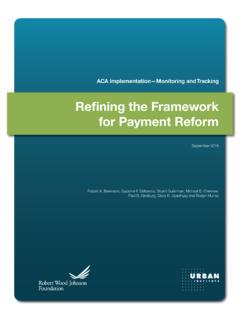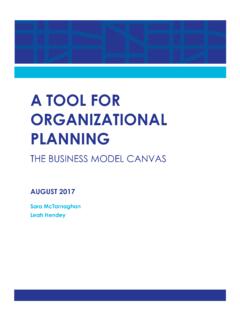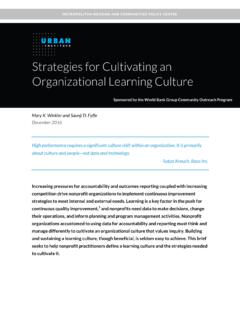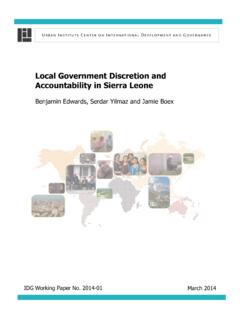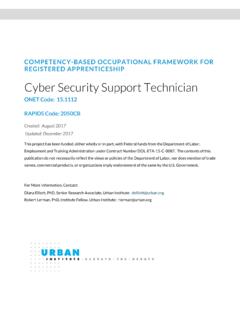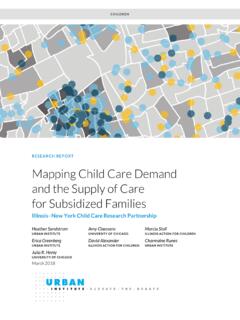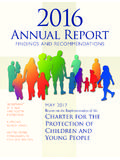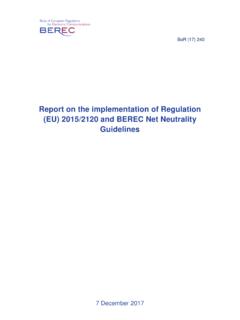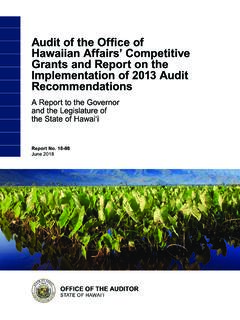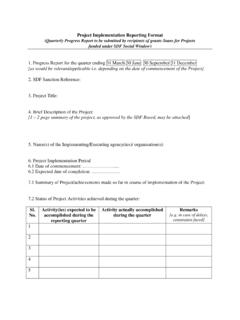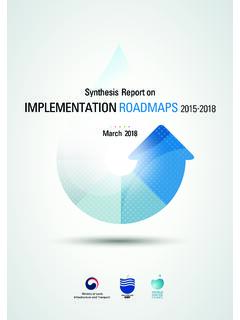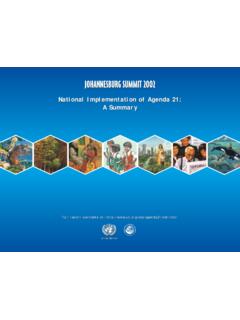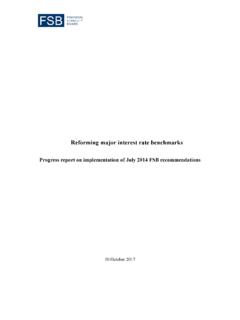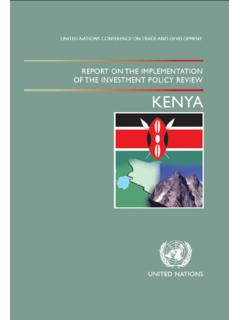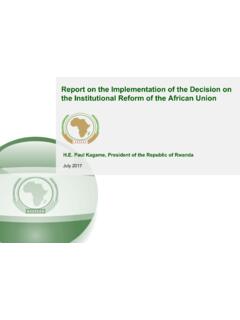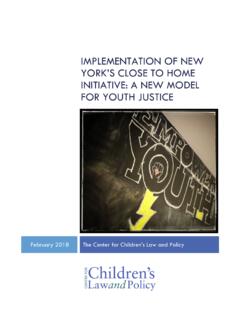Transcription of RESEARCH REPORT An Evaluation of the Impacts …
1 1 RESEARCH REPORT An Evaluation of the Impacts and implementation approaches of financial coaching Programs Brett Theodos Margaret Simms Mark Treskon Christina Stacy Rachel Brash Dina Emam Rebecca Daniels Juan Collazos October 2015 2 financial coaching Evaluation ABOUT THE URBAN INSTITUTE The nonprofit Urban Institute is dedicated to elevating the debate on social and economic policy. For nearly five decades, Urban scholars have conducted RESEARCH and offered evidence-based solutions that improve lives and strengthen communities across a rapidly urbanizing world. Their objective RESEARCH helps expand opportunities for all, reduce hardship among the most vulnerable, and strengthen the effectiveness of the public sector. The Urban Institute is a nonprofit policy RESEARCH organization. It has been incorporated and is operated as a public charity. It has received official IRS recognition of its tax-exempt status under sections 501(c)(3) and 509(a)(2) of the Internal Revenue Code.
2 The Institute s federal ID number is 52-0880375. Donations will be tax deductible and may be disclosed to the IRS and the public, unless given anonymously. We are committed to transparent accounting of the resources we receive. In addition to required tax filings, a copy of the Urban Institute s audited financial statement is available to anyone who requests it. ABOUT OUR FUNDERS The impact Evaluation described in this REPORT was funded by the Consumer financial Protection Bureau (CFPB) under a competitive award, contract number CFP-12-Z-00006. The CFPB is a 21st century agency that helps consumer finance markets work by making rules more effective, by consistently and fairly enforcing those rules, and by empowering consumers to take more control over their economic lives. To learn more about these efforts, visit . To access resources for financial educators, visit The views, findings and conclusions in this REPORT are those of the authors, and do not necessarily reflect those of the Consumer financial Protection Bureau.
3 The process Evaluation described in this REPORT was funded by the Annie E. Casey Foundation. We thank them for their support but acknowledge that the findings and conclusions presented in this REPORT are those of the authors alone, and do not necessarily reflect the opinions of the Foundation. Copyright October 2015. Urban Institute. Permission is granted for reproduction of this file, with attribution to the Urban Institute. Cover image courtesy of The financial Clinic. 1700 G Street, , Washington, DC 20552 October 2015 Dear Colleagues, The Consumer financial Protection Bureau (CFPB) is pleased to have commissioned this groundbreaking RESEARCH on the impact of two financial coaching programs on how consumers manage their financial lives. The mission of the CFPB is to make markets for consumer financial products and services work for consumers by making rules more effective, by consistently and fairly enforcing those rules, and by empowering consumers to take more control over their economic lives.
4 Empowering consumers includes supporting their ability to make financial decisions and to choose and use financial products in ways that will help them to meet their own life goals. There has been a growing call in the financial education field for more evidence to indicate how and when financial education strategies can improve consumer financial decision making. The CFPB has taken up this challenge to provide stronger evidence of what works, in order to support and guide financial educators as they do their important work in helping consumers. This study is one milestone in meeting that challenge. Using an experimental design, this study allows, for the first time, a fully causal assessment of the impact of financial coaching , as practiced by the two programs, on the low- and moderate-income consumers they serve. Finding robust effects in an Evaluation of financial coaching is particularly challenging because coaching services are driven by the individual consumers own goals and needs, and each person has a different starting situation and different goals.
5 The design of this RESEARCH allows us to separate the effects of the program itself from the characteristics of people likely to seek coaching . The study finds that among people who were interested in taking steps toward their financial goals, those with access to coaching did better than those without. Those who met with a coach even once improved their money management skills and saw meaningful gains on a range of financial health and well-being outcomes. Consumers face many complex and consequential financial decisions throughout their lives. A financial coach can serve as a capable and trusted guide to help consumers navigate those decisions, especially consumers who do not have access to professional financial advisors or to experienced financial mentors among their family and friends. A study like this is a significant undertaking, and we are grateful for the contributions of everyone involved - the Urban Institute, The financial Clinic, Branches, and the study participants.
6 We also acknowledge the Annie E. Casey Foundation for separately funding a companion process Evaluation which is also described in this REPORT . The findings will inform our own work to empower consumers to take more control over their economic lives in order to serve their own life goals, and we hope it will provide similar value to others working toward that same goal. Sincerely, Gail Hillebrand Associate Director for Consumer Education and Engagement Consumer financial Protection Bureau TABLE OF CONTENTS III Contents Acknowledgments v Executive Summary vi What Did the Field Already Know? vi What Programs Did We Study? vii How Did We Study These Programs? viii Who Enrolled in the Study? x How Did financial coaching Work in Practice? xii Who Took Up and Stayed with coaching ? xiii What Effects did coaching Have? xv What Are the Study s Implications? xxii Chapter 1. Introduction 1 Chapter 2. Background 3 financial Literacy, and Capability 3 financial Education 5 financial Counseling 8 financial coaching 10 Chapter 3.
7 Program Sites and Models 17 Branches 17 The financial Clinic 20 Chapter 4. Methodology and Data Sources 23 Recruitment and Randomization 23 Data Sources 28 Data Analysis 40 Chapter 5. Program Applicants at Entry 51 Demographic Characteristics of Study Participants 51 financial Status, Behaviors, and Goals of Participants 53 Location of Applicants 58 Chapter 6. Program implementation 60 Theory of Change for financial coaching Programs 60 Motivation for Seeking financial coaching 62 Coach Characteristics, Clients Views of Coaches, and coaching Environment 66 Content of coaching Sessions 70 Client Persistence with coaching 80 IV AN Evaluation OF THE Impacts OF financial coaching PROGRAMS Influence of the RESEARCH Study and Adherence to Program Models 81 Chapter 7. Service Take-up 83 Take-up Rates and Duration 83 Analysis of Treatment Take-up 87 Impediments to Pursuing coaching 93 Chapter 8. Program Impacts 98 Impact Study Population and RESEARCH Questions 98 Savings 99 Expenses, Bill Payment Patterns, and Debt 108 Delinquencies, Bankruptcies, Collections, and Liens 121 Alternative financial Services 127 Credit Score and Progress toward Improving Credit 129 financial Planning and Budgeting 132 financial Stress, Well-being, and Confidence 137 Credit REPORT Familiarity, Access, and Understanding 142 financial Knowledge 145 Heterogeneous Effects 147 Chapter 9.
8 Conclusions and Implications 148 Appendix A. Definitions of Impact Variables 152 Appendix B. Branches and The financial Clinic Combined Impact Findings 157 References 169 About the Authors 176 Statement of Independence 180 ACKNOWLEDGMENTS V Acknowledgments The RESEARCH effort culminating in this REPORT was funded, separately, by the Consumer financial Protection Bureau (CFPB) and the Annie E. Casey Foundation. Thanks first to the team at CFPB for initiating and supporting the random control trial Evaluation : Xiaoling Ang, Cassandra McConnell-Tatum, Genevieve Melford, Janneke Ratcliffe, and Irene Skricki, and formerly, Camille Busette. Thanks also to the CFPB team for their contributions during the entire course of this study from the early stages of site selection to final stages of reviewing and commenting on this REPORT . We also want to express our thanks to the team at the Annie E. Casey Foundation and their support of the process study and its integration into the random control trial Evaluation : Cindy Guy, Irene Lee, Regina Salliey, and T Pring Westbrook.
9 This study could never have been completed without the tireless work of the dedicated staff of Branches and The financial Clinic. Special thanks to Lars Gilberts, formerly Director of financial Stability Services with Branches, and Mae Watson Grote, the executive director of The financial Clinic, for their work co-creating this study. Thanks also to the tremendous staff of both organizations for their work assisting with the RESEARCH study while maintaining their day jobs of providing and overseeing services: Executive Director Brent McLaughlin, Karina Ron, Alexandra Hernandez, and formerly, Darren Liddell at Branches; and Haidee Cabusora, Josh Blankenbeckler, and formerly, Mauricio Garcia, at The financial Clinic. At the Urban Institute, thanks to Claudia Sharygin for her help in the early design phases of this study and to Jessica Kelly for building the randomization tool used by both sites. Thanks to SSRS for their extremely dedicated work fielding the outcome survey with a special thanks to Jordon Peugh for overseeing the effort.
10 Thanks also to Diane Preciado for her assistance with in-person survey fielding. Thanks finally to Lewis Mandell, J. Michael Collins, and Doug Wissoker for expert review and advice at various points along the project. VI AN Evaluation OF THE Impacts OF financial coaching PROGRAMS Executive Summary Increasing interest in the role that consumer-focused policy interventions can play in improving economic outcomes has led to a host of intervention models in recent years. financial coaching has emerged as one prominent model in this field, aimed at improving consumer financial outcomes by using regular one-on-one sessions to set goals and plan concrete steps to meet and manage those goals over time. Unlike counseling, coaching takes a client-driven approach; instead of focusing on solving particular problems, the coach provides a framework for the client to meet his or her goals. What Did the Field Already Know? The interest in interventions like financial education, financial counseling, and financial coaching comes in part from literature linking financial literacy and a range of positive economic outcomes.

